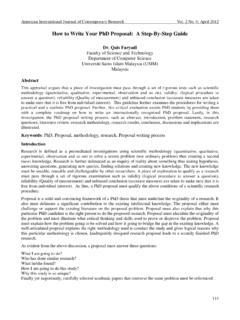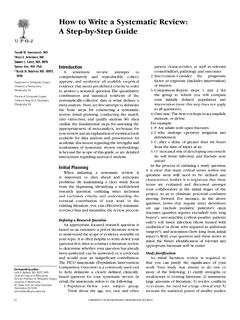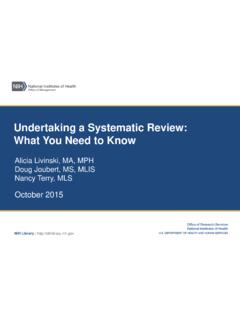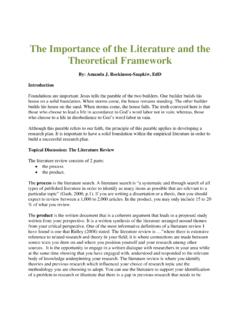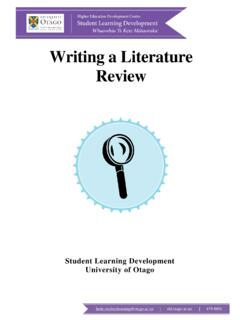Transcription of How to write a systematic literature review: a guide for ...
1 How to write a systematic literature review : a guide for medical students Author: Rory J Piper, BMedSci(hons) Secretary, NSAMR, 2013 University of Edinburgh 2 How to write a systematic literature review : a guide for medical students Why write a systematic review ? When faced with any question, being able to conduct a robust systematic review of the literature is an important skill for any researcher to develop; allowing identification of the current literature , its limitations, quality and potential. In addition to potentially answering the question, the information will give guidance to the planning and suggestion of the value of novel research.
2 Significant experimental endeavours should be preceded by a comprehensive review of the subject and should exhibit the same rigour as any laboratory experiment in the assessment of both quantitative and qualitative data. Recent decades have seen the replacement of authoritative reviews by fully systematic assessment of the literature . Enthusiasts of the authoritative/opinionated review would argue that this method allows the reviewer to negate poorly conducted research from both quantitative and qualitative consideration, but such a method inappropriately allows the biased, imprecise and unreliable presentation of evidence.
3 Poorly conducted systematic reviews can mislead just like any other experimental study, yet meticulous planning and execution of the study design can minimise the compromising factors. Objectives This guide aims to serve as a practical introduction to: the rationale for conducting a systematic review of the literature how to search the literature qualitative and quantitative interpretation how to structure a systematic review manuscript Important definitions: A systematic literature review attempts to identify, appraise and synthesize all the empirical evidence that meets pre-specified eligibility criteria to answer a given research question (Cochrane definition, 2013).
4 A meta-analysis is a statistical assessment of the data provided from multiple studies or sources that attempt to ask/answer the same question. 3 Generating a hypothesis Like an experimental investigation, review of the literature and assessment of previously acquired data is conducted to test a hypothesis. In this regard, a review does not differ in attempting to test hypotheses, synthesise a new idea or reach a conclusion. A vague question is likely to lead to a vague answer. It may be advised, therefore, to limit the review question and/or aims in synchrony with a limited systematic search, discussed in the next section.
5 Searching the literature What to search literature search engines work by automatic, algorithmic assessment of a search string. Despite the many advantages of this approach, it is often difficult to strike a balance between broad and specific searching. Subjects of high interest such as stroke are heavily investigated, so a simple search of stroke generates over ten-thousand results. Therefore a specific search using a well thought out collection of keywords (or search string ) is required to whittle down hundreds, if not thousands, of published studies in any one paradigm.
6 A suitable search-string for a search engine is specific, inclusive and aware of the variability in terminology/reporting. For the example, a search for investigating the efficacy of a neuroprotective drug: (drug-x OR drug-x-alternative-name(s) OR drug-x-alternative-spelling(s)) AND (stroke OR isch(a)emia OR isch(a)emic OR cerebrovascular accident OR encephalic vascular accident). It is important to be consistent with and document your keywords since it is a requirement to state these in the manuscript. Further limits can be set on automatic searches, but care needs to be taken since inappropriately strict limits may exclude valid search results.
7 Some authors choose to find the literature published within a certain publication time window (justified or not), which can be helpful when reviewing recent advances in a particular field. However, this approach is not appropriate in some systematic searches and certainly not meta-analyses, since influential studies may be eliminated from consideration. Depending on the nature or aim of the review , it may be appropriate to only consider certain types of study (such as case control, randomised controlled trial or cohort) and is Important definition: A hypothesis is a proposed explanation for an observation, one that may be investigated (scientific hypothesis) or may be carried forward (working hypothesis).
8 4 particularly useful when there are too many studies found to be considered for a qualitative review . Where to search literature search engines are powerful tools. However, there are differences between these sources and care needs to be taken to ensure that all relevant data is obtained. Multiple engines should therefore be employed in a systematic search; The PubMed, Medline/OvidSP (includes EMBase), Web-of-Science and BIOSIS search engines should be considered. Furthermore, to reduce the influence of publication bias, abstracts presented at an appropriate and justified selection of conferences should be manually searched.
9 An obvious, but important point to remember is that there may already be a review (s) similar to that which you are considering, and effort to find these should be made (with help from the Cochrane library and similar resources). Discovery of such may not necessarily negate the value of conducting a review , but may further hone its purpose. Manual scoping for studies cited by articles your review turns up, but that do not appear after in the algorithmic search itself ( grey literature ), provide further studies for inclusion in your review .
10 Subscription to updates, according to the search string, from databases used allow the author to be alerted to the publication of new studies meeting the search criteria, allowing inclusion of studies that are published between the conducting of the search and to the writing of the report. This is particularly important since a review is strictly out-of-date as soon as a new study emerges. Managing your findings A meticulous search must be coupled with meticulous record keeping. Inclusion and rejection of studies found in literature researching must adhere strictly to selection criteria set out accordingly to answer the review pre-determined questions and/or aims (pre-determine to minimise selection bias).
